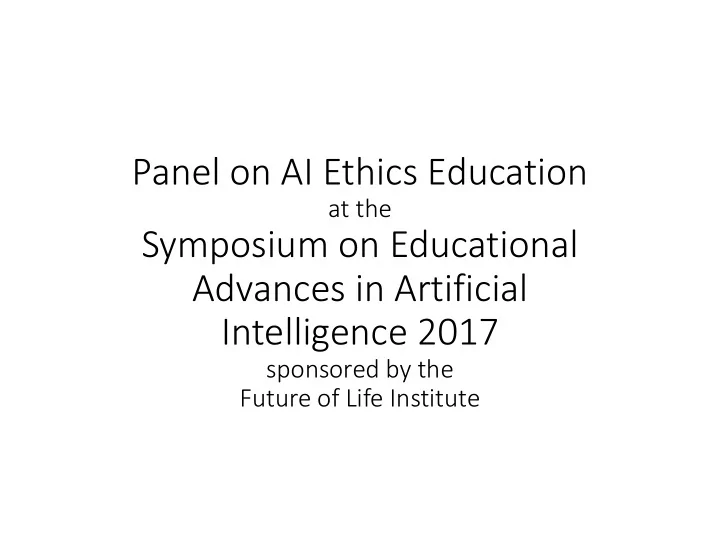

Panel on AI Ethics Education at the Symposium on Educational Advances in Artificial Intelligence 2017 sponsored by the Future of Life Institute
Responsible Use of AI Technologies • Recent Headlines • Facebook touts AI benefits as job risks loom • The pros and cons of using a robot as an investment adviser • Robots can kill and deliver beer. Do we need humans? • As Artificial Intelligence evolves, so does its criminal potential • Should your driverless car hit a pedestrian to save your life?
Responsible Use of AI Technologies • Issues • AI systems can process large quantities of data, detect regularities in them, draw inferences from them and determine effective courses of action -- sometimes faster and better than humans and sometimes as part of hardware that is able to perform many different, versatile and potentially dangerous actions. • The behavior of AI systems can be difficult to validate, predict or explain since they are complex, reason in ways different from humans and can change their behavior via learning. • Their behavior can also be difficult to monitor by humans in case of fast decisions, such as buy and sell decisions on stock markets.
Responsible Use of AI Technologies • Questions • Do we need to worry about the reliability, robustness, and safety of AI systems? • Do we need to provide oversight of their operation? • How do we guarantee that their behavior is consistent with social norms and human values? • Who is liable for incorrect AI decisions? • How will AI technology impact standard of living, distribution and quality of work, and other social and economic aspects?
Responsible Use of AI Technologies • Activities at AAAI 2017 • Workshop: AI and OR for Social Good • Workshop: AI, Ethics and Society • Invited Panel: AI for Social Good • ACM SIGAI Student Essay Contest on the Responsible Use of AI Technology • JAIR Special Track on AI and Society • Activities elsewhere • OSTP Workshops on Preparing for the Future of AI (on benefits and risks of AI) • Partnership on AI (to benefit people and society) • IEEE Standards Association’s Global Initiative for Ethical Considerations in the Design of Autonomous Systems • …
Panel on AI Ethics Education • The panel will discuss how, as educators, we can incorporate ethical issues into undergraduate or graduate AI classes via class assignments or projects, a single lecture, a larger segment of lectures or a whole class • Format • 13 minute statement by each panelist • 15 minute discussion
Panel on AI Ethics Education • Ben Kuipers, Professor at the University of Michigan • Fellow of AAAI • Fellow of IEEE • Fellow of AAAS • Ethics officer of ACM SIGAI • Currently spends his sabbatical on researching AI ethics
Panel on AI Ethics Education • Illah Nourbakhsh, Professor at Carnegie Mellon University (CMU) • Member of the Global Future Council on the Future of AI and Robotics for the World Economic Forum • Senior Advisor to the Future Society, Harvard Kennedy School • Executive Board of the Society of Responsible Robotics • Book author of “Robot Futures” and “Parenting for Technology Futures” • Developed “Ethics and Robotics” class (resources available at ethicsandrobotics.org)
Panel on AI Ethics Education • Judy Goldsmith, Professor at the University of Kentucky • Senior member of AAAI • Mentoring awards from CRA and AAAS • Teaching awards on the department, college and university levels • Developed “Science Fiction and Computer Ethics” class • Co-author (with Emanuelle Burton, Nicholas Mattei, and others) of a textbook on "Science Fiction and Computer Ethics”
Panel on AI Ethics Education • World Economic Forum • Unemployment: What happens after the end of jobs? • Inequality: How do we distribute the wealth created by machines? • Humanity: How do machines affect our behavior and interaction? • Artificial stupidity: How can we guard against mistakes? • Racist robots: How do we eliminate AI bias? • Security: How do we keep AI safe from adversaries? • Evil genies: How do we protect against unintended consequences? • Singularity: How do we stay in control of a complex intelligent system? • Robot rights: How do we define the humane treatment of AI?
Recommend
More recommend